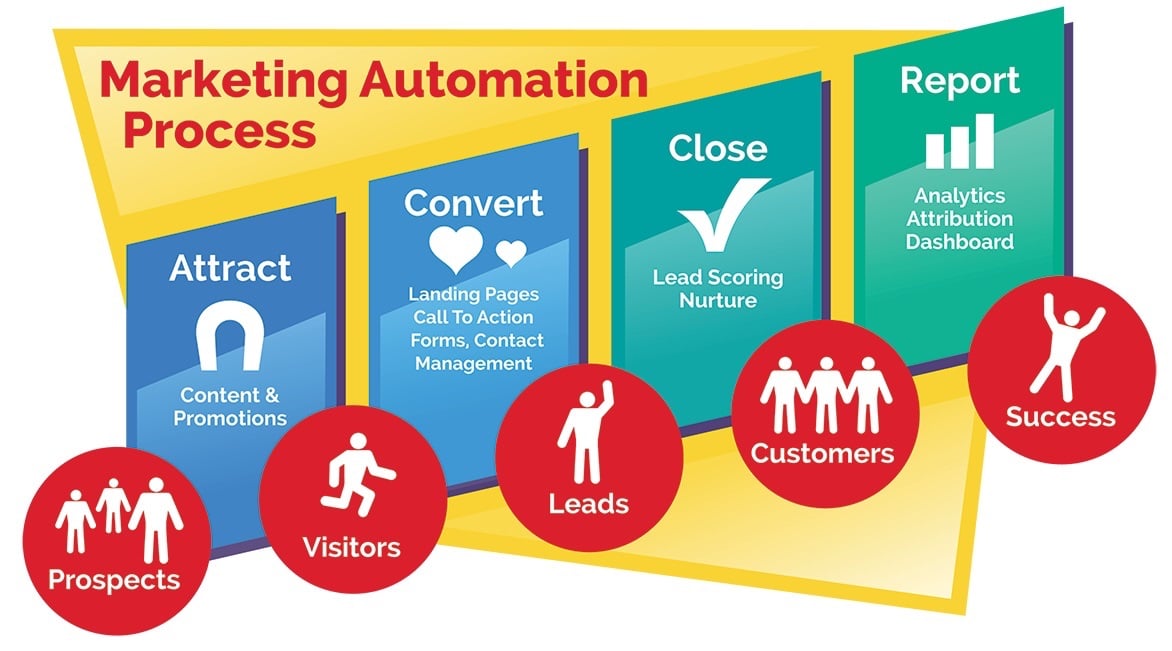Discover how marketing automation can revolutionize your campaigns, enhance efficiency, and deliver better results with Techtenstein’s comprehensive guide to implementing automation strategies effectively.
Introduce the concept of marketing automation and its significance in modern digital marketing strategies. Highlight the benefits of automation in streamlining marketing processes, improving efficiency, and driving better results.

1. What is Marketing Automation?
- Definition and Overview
- Define marketing automation and provide an overview of how it automates repetitive tasks, such as email marketing, social media posting, lead nurturing, and more.
2. The Benefits of Marketing Automation
- Improved Efficiency
- Discuss how automation saves time and resources by automating manual tasks, allowing marketers to focus on strategic activities.
- Enhanced Personalization
- Highlight the importance of personalized marketing messages and how automation enables marketers to deliver tailored content to their audience at scale.
- Increased ROI
- Explore how automation contributes to higher ROI by optimizing marketing campaigns, nurturing leads more effectively, and improving conversion rates.
3. Key Components of Marketing Automation
- Email Marketing Automation
- Discuss the role of marketing automation platforms in automating email campaigns, including drip campaigns, lead nurturing sequences, and email personalization.
- Social Media Automation
- Explain how marketing automation tools can schedule and publish social media posts, engage with followers, and analyze social media performance.
- Lead Management and Nurturing
- Explore the importance of lead management automation in capturing, qualifying, and nurturing leads through the sales funnel.
4. Implementing Marketing Automation: Best Practices
- Set Clear Goals and Objectives
- Guide businesses on defining clear goals and objectives for their marketing automation strategy, such as increasing lead generation, improving customer retention, or driving sales.
- Segment Your Audience
- Discuss the importance of segmenting the audience based on demographics, behavior, or interests to deliver targeted and relevant marketing messages.
- Create Compelling Content
- Emphasize the significance of creating high-quality, engaging content to capture the audience’s attention and drive conversions through automated campaigns.
5. Choosing the Right Marketing Automation Platform
- Evaluate Your Needs
- Provide tips for assessing your business needs and requirements before selecting a automation platform, considering factors such as budget, scalability, features, and integrations.
- Compare Different Platforms
- Compare popular marketing platforms, such as HubSpot, Marketo, Pardot, and Mailchimp, based on their features, pricing, customer support, and user reviews.
6. Integrating Marketing Automation with Your CRM
- Syncing Data Between Platforms
- Explain the importance of integrating automation with customer relationship management (CRM) systems to align marketing and sales efforts, track leads, and measure campaign performance.
- Automating Workflows
- Explore how automated workflows streamline lead management processes, from lead capture to conversion, by automatically assigning leads, sending follow-up emails, and updating lead statuses.
7. Measuring and Analyzing Campaign Performance
- Track Key Metrics
- Identify essential marketing metrics to track, such as open rates, click-through rates, conversion rates, and ROI, to measure the effectiveness of your automated campaigns.
- Use Analytics Tools
- Highlight the importance of leveraging analytics tools, such as Google Analytics, marketing automation platform analytics, and CRM reports, to gain insights into campaign performance and make data-driven decisions.
8. Continuous Optimization and Testing
- A/B Testing
- Discuss the significance of A/B testing in optimizing marketing campaigns by testing different elements, such as subject lines, CTAs, and email content, to identify what resonates best with the audience.
- Iterative Improvements
- Encourage businesses to continuously analyze campaign data, identify areas for improvement, and iterate on their automation strategies to achieve better results over time.
9.Future Trends in Marketing
- AI and Machine Learning
- Explore emerging trends in marketing automation, such as the integration of artificial intelligence (AI) and machine learning algorithms for predictive analytics and behavior-based targeting.
- Hyper-Personalization
- Discuss the trend towards hyper-personalization in marketing automation, where campaigns are tailored to individual preferences and behaviors.
Summarize the key points discussed in the article, emphasizing the transformative impact of marketing on streamlining campaigns, enhancing efficiency, and driving better results. Encourage businesses to leverage automation tools and strategies to stay competitive in the digital marketing landscape and achieve their marketing goals effectively



